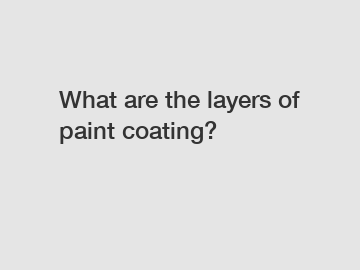What are the layers of paint coating?
The layers of paint coating refer to the different levels of protection applied to a surface. In order to understand the layers of paint coating, it is important to delve into their origins, explore the process of their application, and recognize their crucial significance and impact.
The concept of paint coating dates back centuries, with early civilizations using naturally occurring pigments mixed with binders such as oil or wax to protect their structures from the harsh elements. As time progressed, advancements in technology and materials enabled the development of more sophisticated paint coatings.
Modern paint coatings typically consist of three main layers: the primer, the intermediate coat, and the topcoat. Each layer serves a specific purpose in the overall protection and aesthetic appeal of the painted surface.

The first layer, known as the primer, acts as a preparatory coating that promotes adhesion between the surface and subsequent layers. It serves as a protective barrier against corrosion, enhances paint durability, and provides a smooth surface for the application of the intermediate coat.
The intermediate coat, also referred to as the base coat or the undercoat, is the second layer applied to the surface. This layer is responsible for providing color, hiding imperfections, and forming a uniform foundation for the final layer. Additionally, it adds thickness to the paint coating, enhancing its protective qualities.
Finally, the topcoat is the visible layer that adds the final color and sheen to the surface. This layer acts as the primary barrier against external factors such as UV radiation, moisture, and physical abrasion. It also contributes to the overall aesthetic appeal of the painted surface.
The significance of these multiple layers lies in their combined effort to provide optimal protection and longevity to the painted surface. By using a layering system, paint coatings are able to withstand various environmental conditions, prevent premature degradation, and maintain their appearance for extended periods.
Furthermore, the layering process allows for customization and flexibility in terms of color and finish. It enables individuals to choose from a wide range of colors, textures, and gloss levels, ensuring that the final result meets their specific requirements and desired aesthetics.
The impact of paint coating layers extends beyond the surfaces they protect. The use of high-quality and durable coatings contributes to the longevity of structures, minimizing the need for frequent repaints or repairs. This, in turn, reduces overall maintenance costs and promotes sustainability by minimizing waste.
In conclusion, the layers of paint coating encompass the primer, intermediate coat, and topcoat, each serving a distinct purpose in providing protection and aesthetics. Understanding the origins, application process, and significance of these layers highlights the evolution of paint coating technology and its essential role in preserving and enhancing surfaces. Harnessing the power of layering techniques ensures the durability, longevity, and visual appeal of painted surfaces while also minimizing maintenance and promoting sustainability.
The company is the world’s best wholesale color coated aluminum coil, color coated aluminium coil supplier, stone grain coated aluminium sheet supplier. We are your one-stop shop for all needs. Our staff are highly-specialized and will help you find the product you need.


